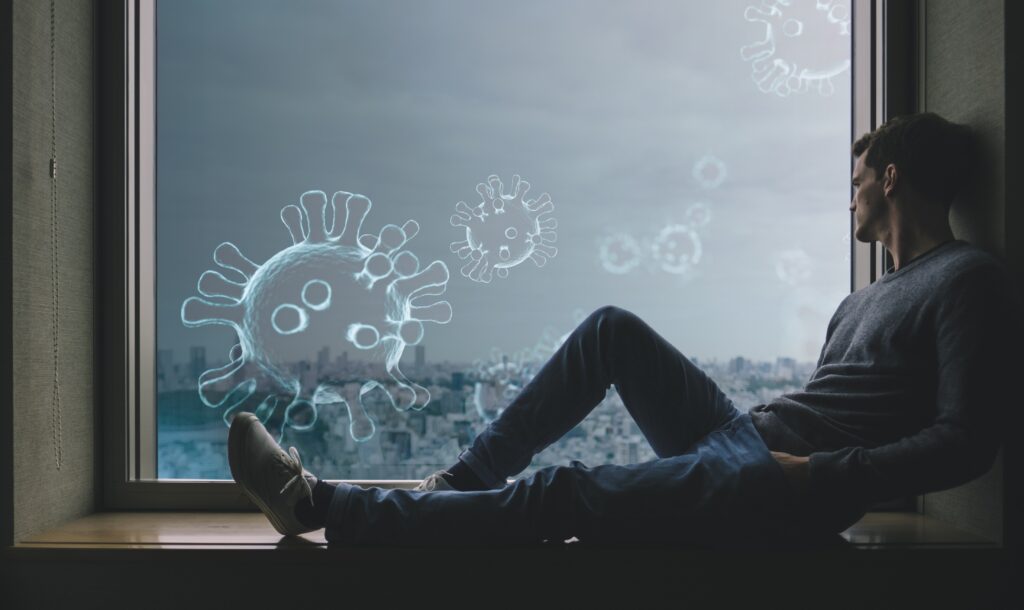Solastalgia is a neologism introduced by Australian Philosopher Glenn Albrecht to describe the psychic harm caused by environmentally induced distress. Any context in which pervasive change to the existing order challenges place identity has the potential to deliver solastalgia. COVID-19 has surfaced as a pervasive change to the existing order and it has challenged the normal relationship between psychic identity and home. Lockdown and quarantine made us homesick while staying home. This blog post views March 2020 directives from this spectacle of solastalgia.
EDLM sends out “directives”–or surveys on focused issues–periodically to our volunteer writers. The March 23, 2021 directive, asking our writers to tell us how the pandemic has affected their everyday lives, arrived amidst the first, most restrictive phase of lockdown. On March 16 Governor Eric Holcomb ordered bars and restaurants closed. Ball State had cancelled in-person class on March 11. These directives reflect on the ways with which the COVID-19 Quarantine affected the quotidian life cycle of Munsonians. These directives uncover the experience of the disease, fear of catching the virus, grief and anger over the loss of daily routine, work problems and psychic distress.
Being imprisoned in an old house renders the feelings of discomfort or distress. Diarist A28 states “After the first few weeks of the stay at home order, I was sure that I knew how a ghost must feel: Stuck in an old house, wearing the same clothes day after day, roaming from room to room….” “The stay home order” broke the normal rhythm of life and put people in a state of desolation all over the globe. It’s interesting to note how staying at home evokes the feelings of being a ghost. The pandemic has created a situation in which, as Diarist A28 notes “There is no foreseeable future…A strange world we have been thrown into”. This strange world makes our familiar world unfamiliar. The same home gives unhomely vibes. The sense of unfamiliarity is evident in the form of the solastalgic response of Diarist H67, who writes about the quarantine’s effect on “relationships, daily routines…I have been affected mostly physically and mentally. I have been affected physically by the outbreak, because it has limited my ability to workout and keep my body maintained.”
In the context of pandemics, Glenn Albrecht argues that the home becomes pathological and people dwelling in the home experience a devastating disease burden (Albrecht). In the same vein, Diarist H66 reflects on her experience “My husband’s new assignment was in the Emergency Room… He and I are preparing to get the disease at some point with his high level of exposure.” Diarist C45’s home during lockdown presents similar distress because his family members are working in the healthcare industry. The burden of disease creates an environment of fear. Diarist A2, with most of his family infected with mild but unpleasant cases of COVID, describes this fear “That fear brought home to me how easily a normal, comfortable life can be uprooted and how fragile our whole society is.”
A number of similar strains of quarantine-induced emotional distress appear in the works of other diarists.
- “I am mindful of creating too many contact points that could spread the virus.” (Diarist B35)
- “I have taken little advantage exercising outside mostly because of the weather at first, but now, it’s a sad inertia.” (Diarist B35)
- “It remains to be seen what our ‘new normal’ will be, and when or if we can return to it.” (Diarist C45)
For some other diarists, lockdown did not change their life that much.
“Experiencing a historical pandemic like this has not changed much in my life.” (Diarist H68)
- “We probably have had less drastic changes than people still employed in the workplace.” (Diarist A15)
- “I’m not an overly gregarious person, so my social life hasn’t changed much.” (Diarist D50)
According to Glenn Albrecht, the pandemics hit the community in such a way that the “sense of home and family relationships are desolated” (Albrecht). March 2020 Directives focus a lot on family relationships because people dwelling under the same roof experience a sense of detachment. Our writers record the changes in their family and social relationships in these directives. Some snippets of these directives are given below.
- “Social isolation is lonely… Even at home, my husband and I try to stay apart most of the time to reduce my exposure.” (Diarist H66)
- “I have come to feel that we feed off people’s energy when we are physically present. It’s not enough just seeing their faces and hearing their voices in a box on a screen.” (Diarist A28)
- “One negative quarantine has given me is not being able to see my girlfriend.” (Diarist H67)
Our quarantine directives and other diaries record the drastic changes in mundane everyday life. Quarantine-induced emotional distress creates solastalgic response in the masses. These changes delineate the complexities of everyday life. We intend to focus on these changes in our upcoming blogs.


